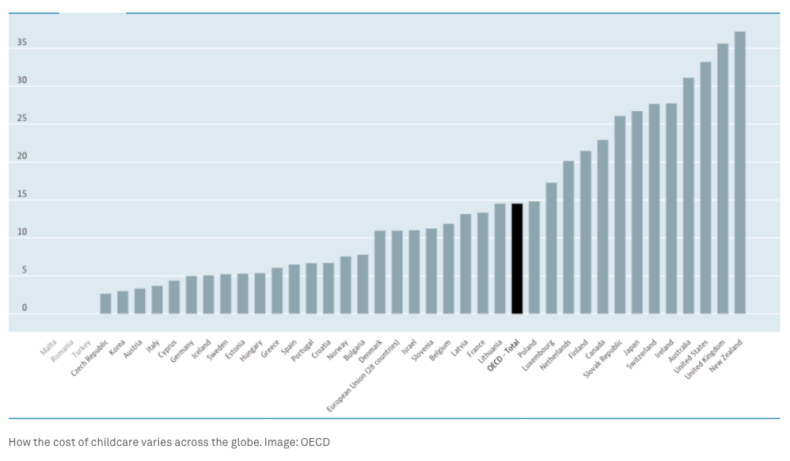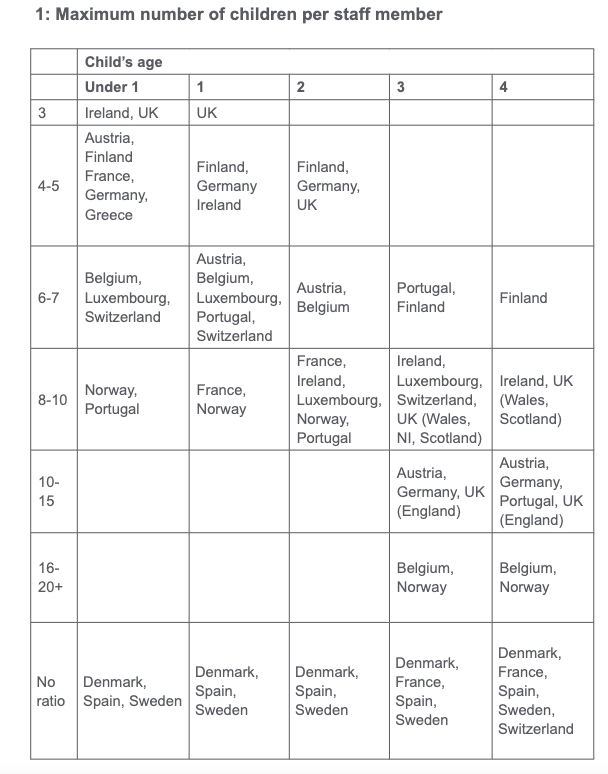The Chancellor’s generous offer to provide 30 hours of ‘free’ childcare for one- and two-year olds will no doubt be popular, but it is symptomatic of Britain’s spiral of decline. Childcare costs are extraordinarily high in the UK. As the graph below shows, a British couple earning the average wage would have to devote 35.7% of their income to pay for the childcare of two young children – more than twice the OECD average and seven times more than it would cost in Germany and Sweden.

.
The obvious question is why can’t we be more like Germany and Sweden. Why is childcare in Britain so incredibly expensive and how can we make it more affordable? Are the staff highly paid? Not particularly. Do nurseries make massive profits? Not really. Why, then, is this market so inefficient?
Politicians refuse to ask these questions because the answer would require too much self-reflection. They have broken the childcare market with subsidies, over-regulation and feel-good policies over a period of many years. Three of the biggest problems, as my colleagues Ryan Bourne and Len Shackleton have pointed out, are the unnecessary qualifications childminders are required to have, Ofsted being in charge of micro-managing the curriculum, and nurseries being forced to employ more staff than they need.
As the table below sets out, the staff-to-child ratio in England is absurdly low, especially for the youngest children. No country is stricter than the UK when it comes to kids under the age of three (the ones the government is about to start providing universal subsidies for). Several countries, including such progressive favourites as Sweden and Denmark, have no mandatory ratio at all.

In this, as in so many other areas of public policy, the Government shows itself unable to trust people to act responsibly. Instead of relying on inspections to ensure nurseries are being run in a safe and sensible manner, it lays down rules on every aspect of the business, always erring towards extreme caution.
Supporters of these regulations would argue that they are essential for health and safety, but the rest of the world doesn’t seem to agree. When it was rumoured that Jeremy Hunt would be relaxing one of England’s childcare ratios from 5:1 to 4:1 to bring it in line with Scotland, the BBC quoted a charity called the Early Years Alliance saying that this modest reform risked ‘severely compromising the safety and quality of care’ and would put more pressure on the workforce during ‘a severe staffing crisis’.
Let us leave aside the fact that allowing fewer staff to look after more children would alleviate, not exacerbate, a staffing crisis. Let us also ignore the implausible implication that Scotland is a haven of light touch regulation. This little intervention illustrates two more reasons why Britain ends up with rotten laws and broken markets.
Firstly, the BBC did not bother to seek a quote from someone who thinks that relaxing the ratio is a jolly good idea and the Government should go further. There is an implicit assumption that law-making is a one way ratchet towards ever greater state control and ever higher public spending, with any deregulation being the road to perdition. Charities and left-wing academics are therefore the only people worth listening to. If we must have another point of view, it should come from some trade association whose members are all greedy bastards who only care about money.
Secondly, it will come as no surprise to those who follow such debates closely, that the Early Years Alliance, a charity that spends a considerable amount of effort lobbying the government, receives millions of pounds from the government and very little in the way of donations from individuals. Moreover, most of its lobbying seems to involve trying to get more money from the government.
As it happens, the rumours that Jeremy Hunt would relax the childcare ratio for two-year-olds from 4:1 to 5:1 were correct. This is still much lower than countries like the Netherlands (6:1) and France (8:1), let alone Denmark and Germany where there is no limit at all, but at least it brings England in line with those anarchists in Scotland.
It is a tacit admission that the Government’s zeal for over-regulation has contributed to the problem. It will help a bit, but the announcement of this reform was merely a slightly embarrassed throat-clearing exercise from Hunt before he told MPs what they really wanted to hear, that he would using yet more borrowed money to subsidise yet more childcare.
Giving people ‘free’ childcare does not bring down the price of childcare. On the contrary, it raises the price of childcare by increasing demand for it. All the subsidies do is shift the cost from one taxpayer to another, just as housing benefit and ‘Help To Buy’ shifts the costs of unnecessarily expensive housing to the taxpayer.
These, and many other, costs could be brought down if the Government took on a few special interest groups and fixed the underlying problems, but this would give politicians fewer opportunities to ride to our rescue waving the HMRC credit card aloft.
The Government is the double-glazing salesman who rings your doorbell after throwing a brick through your window. If it moves, they regulate it. If it stops moving, they subsidise it. And when it starts to smell, they nationalise it.
Click here to subscribe to our daily briefing – the best pieces from CapX and across the web.
CapX depends on the generosity of its readers. If you value what we do, please consider making a donation.


